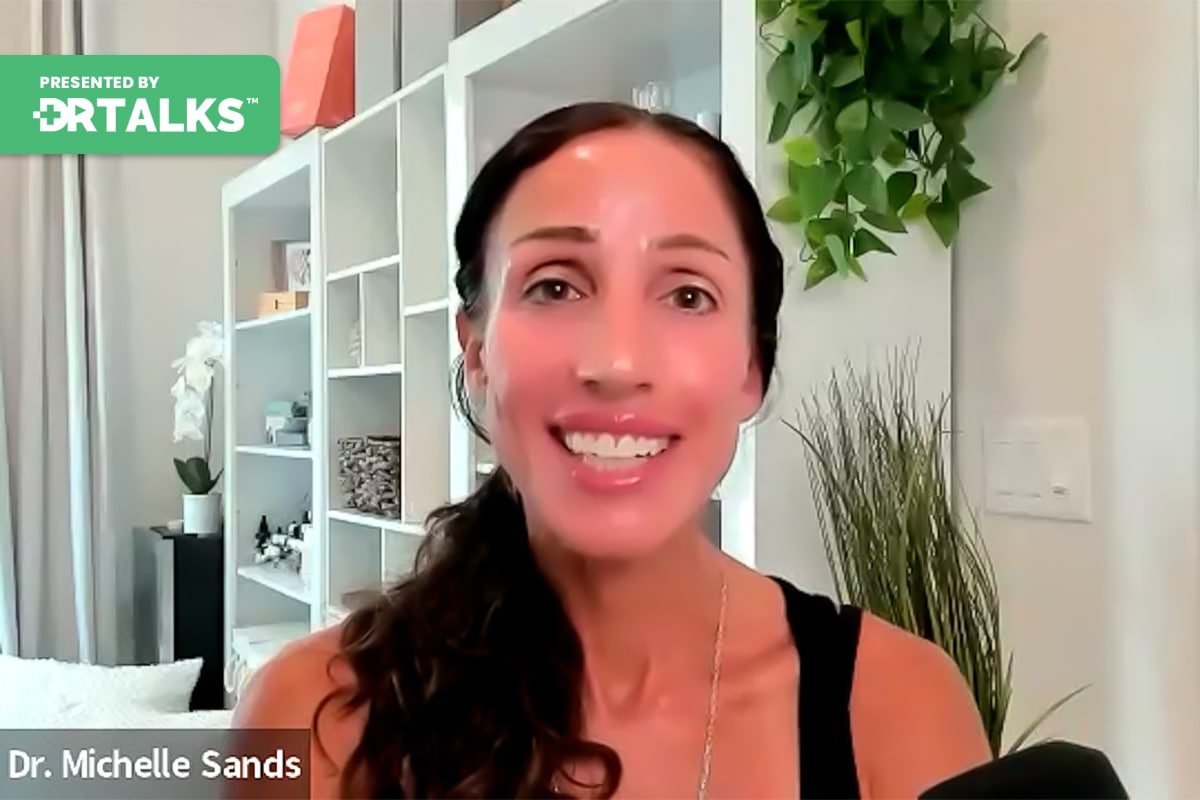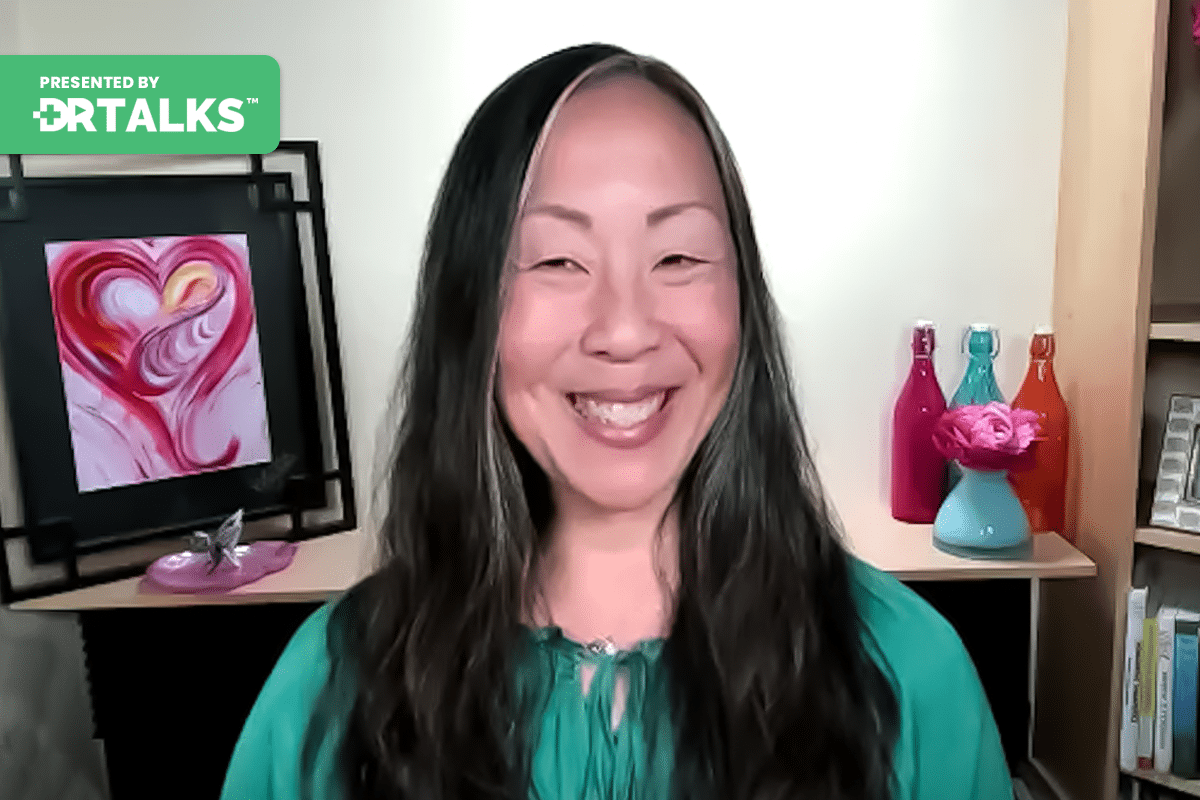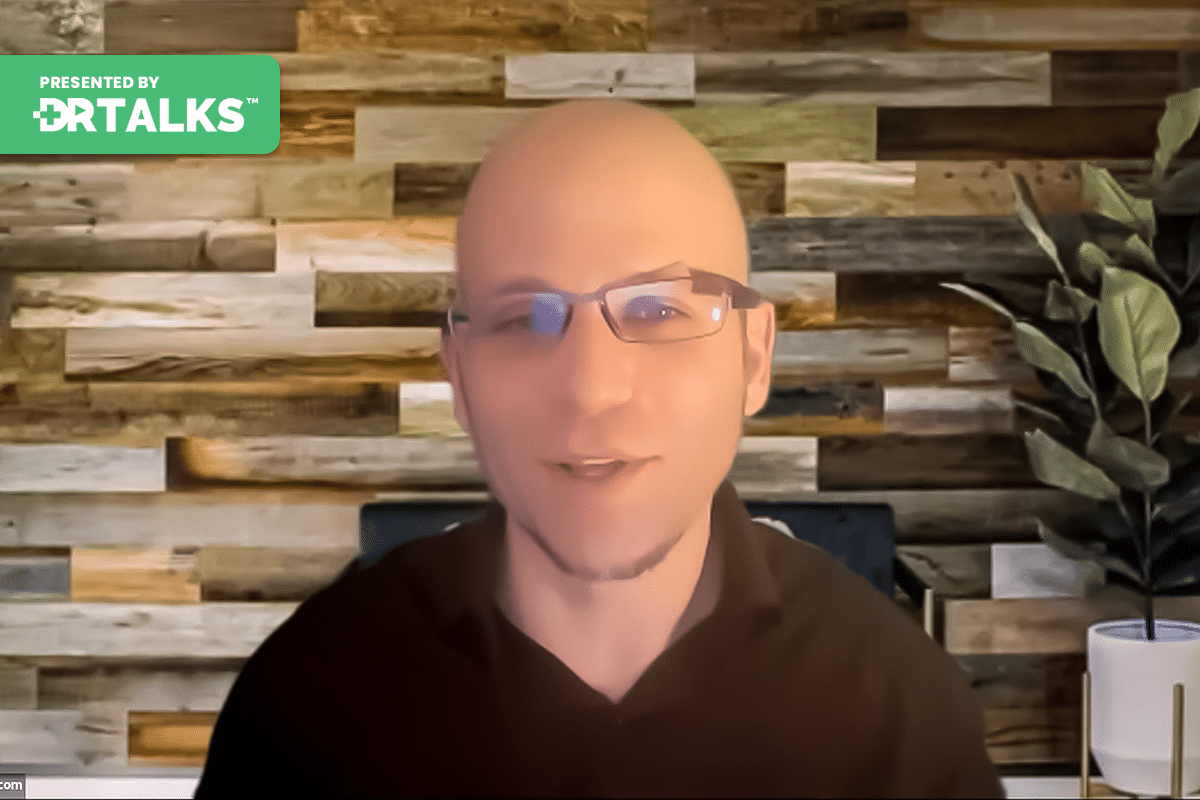Join the discussion below

Dr. Jenny Pfleghaar is a double board certified physician in Emergency Medicine and Integrative Medicine. She graduated from Lake Erie College of Osteopathic Medicine. She is the author of Eat. Sleep. Move. Breath. A Beginner's Guide to Living A Healthy Lifestyle. Dr. Jen is a board member for the Invisible... Read More

Nafysa Parpia, ND has an independent practice at Gordon Medical associates, specializing in the treatment of Lyme disease and other complex chronic illnesses such as autoimmunity, mold toxicity, fibromyalgia, environmental toxicity and gastrointestinal disorders. Her patients with chronic Lyme Disease are typically those who either do not do well with antibiotics, or prefer... Read More
- Understand if and how thyroid disease can be a comorbidity for COVID-19, potentially influencing disease severity and outcomes
- Explore whether COVID-19 can precipitate thyroid issues, shedding light on the complex interactions between infectious diseases and autoimmunity
- Gain awareness of the vital role of thyroid health in the broader context of pandemic preparedness and response
Related Topics
Ace2 Receptors, Acute Sars-cov-2, Autoimmunity, Chronic Illness, Comorbidity, COVID, Covid-19, Cytokine Storm, Cytomegalovirus, Dormant Infections, Emotional Health, Environmental Toxins, Epstein-barr Virus, Hashimotos, Hypothyroidism, Immune Dysregulation, Immune System, Infections, Inflammation, Inflammatory Cytokine Flare, Inflammatory Cytokines, Long Covid Syndrome, Long-haul Covid, Lyme, Parasites, Spike Protein, Subacute Thyroiditis, Thyroid, Thyroid Disease, Thyroid Function, Trail Of Inflammation, Transient Hyperthyroidism, Uncontrolled Thyroid DysfunctionJen Pfleghaar, DO, FACEP
Hello. It’s your summit host Dr. Jen. Welcome back to the Heal Your Thyroid and Reverse Hashimoto’s summit. We are going to be talking to Dr. Nafysa Parpia. She is a board certified naturopathic doctor and has spent the last decade treating patients with complex chronic illnesses. Dr. Parpia is a sought after speaker at medical conferences and summits. She is on ISCI as a board of directors, which is the International Society of Environmentally Acquired Illness, and is a scientific and medical advisor for NeuroHacker Collective. Welcome, Nafysa. So glad to have you today. We’re going to be talking about the relationship between the thyroid gland, autoimmunity and COVID 19. Tell us a little bit more about your practice and what you do.
Nafysa Parpia, ND
Thank you for having me here and thanks for doing this summit. I think it’s super important information and you’re getting it out there. So thank you for doing that. So a little bit about my practice. I focus on patients who have complex chronic illness, so meaning they have issues of inflammation and immune dysregulation that have been caused by a combination of infections and environmental toxins. So patients come from all over the country, even other parts of the world to the clinic.
Jen Pfleghaar, DO, FACEP
So the work you do is amazing.
Nafysa Parpia, ND
Thank you. Thank you.
Jen Pfleghaar, DO, FACEP
So I’m really excited to talk to you about thyroid disease and COVID and, you know, it seems to be know the question is, can thyroid disease be a comorbidity for COVID or, you know, is it is thyroid disease exacerbated by COVID? So can you tell us a little bit about how they play off of each other?
Nafysa Parpia, ND
Yeah. So there’s been some studies that show the patients with controlled hypothyroidism and hypothyroidism do not have a higher prevalence of COVID 19, and they don’t have worse prognosis either when they’re infected with the virus. But the key word here is controlled thyroid diseases, and that’s what most of the studies have been on, actually. So thyroid hormones have a role in immune function. So if your thyroid hormones are normal, you should be fine, whether that’s controlled with medication or if they’re you’re just lucky enough that they’re normal. So it’s plausible that patients with uncontrolled thyroid dysfunction could be at a higher risk for complications. But there’s been contrasting results regarding the immune functions in general. So then it’s been difficult in the research for them to show if it’s about more hypothyroidism or more hypothyroidism, it does seem to be more related to hypothyroidism in Hashimoto’s.
Jen Pfleghaar, DO, FACEP
And that would make sense coming from the auto immunity standpoint. And the other issue is a lot of people don’t know that they have uncontrolled Hashimoto’s because if they’re only checking its age, you know, literally happened today. I had a patient and her thyroid was checked and she got a little note back from her practitioner saying, you know, everything looks fine. And her test was 4.4. And I’m like, that is not fine. So we’re digging into it more. But that could be another problem, right? Someone could not know that they have thyroid problems or that it’s under out of control. And then that could technically be a comorbidity for COVID.
Nafysa Parpia, ND
Right. And that happens every day. So in my practice, I, you know, people come in and they have these mystery symptoms, these mystery illnesses. They don’t know why. They have no idea what’s going on. They’ve been to lots of other doctors. They get a wastebasket diagnosis like fibromyalgia or chronic fatigue syndrome or long haul syndrome or autoimmune conditions, even like Hashimoto’s or what’s that? What’s underneath that? They don’t know. And so it’s our job to really uncover that and, and do full thyroid studies and all kinds of other tests to understand what’s actually going on. But, as far as the impacts of COVID in the thyroid needs to be a lot more research on this regarding the mechanistic actions, there’s just so much that we don’t know yet. And like we were just talking about, people were testing the thyroid necessarily fully. Usually they it’s not tested fully by most doctors. So.
Jen Pfleghaar, DO, FACEP
Right, right. And COVID so new. I mean, it really is. And when we look at a disease that is practically brand new, we’re all still understanding it. And I think it really took a lot of doctors by surprise. Not so much functional doctors, integrative doctors, naturopaths. You know, we kind of understand disease processes and why things happen the way they do and immune dysregulation. So, you know, I think we were all a little bit more prepared for this and better at helping our patients. So when we look at COVID, do you think that or have the study shown that COVID can actually cause thyroid disease?
Nafysa Parpia, ND
So it’s been reported in the studies that abnormal thyroid function can be related to acute SARS-CoV-2 and also in long haul, the studies aren’t clear as to how yet. There are some hypotheses which I want to get into and then there’s also some ideas that I have about it as well. So although the cellular and molecular mechanisms are not completely understood, there are some ideas. So of course there’s the evidence of the cytokine storm and that’s known that that’s an important mediator. So if it happens to attack your thyroid, you can develop hypothyroidism typically or Hashimoto’s. So there needs to be more study. So the other thing is right, despite being considered a respiratory disease, other organs and systems can be affected by the virus, including the thyroid. So we do know this the thyroid gland is well, the hypothalamus and the pituitary. For those of you in the audience who might not know what they are, those regulate the function of most of our hormones. They all express angiotensin converting enzyme two or ace two for short. And that’s the main protein that functions as a receptor, which the virus binds to enter the host cells. So then the spike protein, the virus interacts with ace2 with very high specificity and affinity to the whole, the whole thyroid axis. And then also the immune system cells are targets for thyroid hormone. So T3 and T4 modulate specific immune responses included in that, including natural killer cells sorry and K cell activity, antiviral action of interferon and the procreation of T and B cell lymphocytes. So that’s what that’s what is known so far.
Jen Pfleghaar, DO, FACEP
Yeah, it’s really interesting because when we look at viruses interacting with thyroid, it’s not necessarily a new concept there. There is this subacute thyroiditis situation that you can get and it’s usually caused by different viruses and the thyroid swells up, you get really hyper active and then you need to treat that with steroids or what. I saw one case of subacute thyroiditis. It was actually missed in the E.R. The patient came to see me and I she didn’t want to go on steroids. She wanted more natural. So I put her on low dose naltrexone, and I used ivermectin because she was still having COVID symptoms because it was really it was right during COVID and it calmed her down and her numbers got better. But really, you know, subacute thyroiditis you, you know, something’s wrong. You know, she had an anterior neck pain. She had back cramps because she was losing so much weight because she was so hyper, but no one had checked a free T for free t three. They just checked it. Yes. H So this is why I like listening to these talks are helpful because maybe you are a loved one. They go through something like this and you could be like, Wait, I listened to that talk, that summit and we should dig further. But but yeah, the subacute thyroiditis is very interesting with regards to viruses and COVID and especially some of the studies out that saying that they do see this transient hyperthyroidism, post-COVID, if you would check thyroid labs, but there isn’t a lot of research because not everyone going in the hospital, they’re not checking these thyroid labs routinely on these patients. They’re checking a lot of other markers. But the poor thyroid gets neglected. Right?
Nafysa Parpia, ND
Right. I mean, it happens every day. We see it every day with our patients. It’s just so common. So I want to talk about long COVID and how viruses and other infections. Right. And about how it can cause how long COVID itself can cause what is in remission in our patients to know come to the surface. So what I want to do is take this back to what causes Hashimoto’s in the first place. And I want to look at this from an infectious point of view actually. So this is because COVID 19 has some things in common with all other infections. They all cause an inflammatory cytokine flare. What it doesn’t have in common with most of the other infections, it’s a spike protein. But now we know that the virus infects the cells of the thyroid gland via the ace2 receptor in the spike protein into them. We know that patients who suffer from long COVID syndrome, typically they have the awakening of dormant infections in their immune system that they could previously keep in check. That’s in the research. So the inflammatory cytokines flare from the spike protein or from other proteins in the virus can directly affect the thyroid gland, the hypothalamus and the territory that’s in the research.
And it can also cause dormant infections to flare again in the research. What’s not in the research is how it can lead to Hashimoto’s, but this is where I have some ideas and I want to take this back backwards actually to the root cause of Hashimoto’s, because it’s those that first get flared in long hall and this is where the two intersect. So then there could be other infections. Chronic infections are found in people Hashimoto’s in the first place, infections like Lyme, Epstein-Barr virus, cytomegalovirus, parasites. There’s papers on that, right, including Lyme and Epstein-Barr virus H pylori Yersinia and so. Well, COVID 19 infection comes and it goes, but it leaves behind a trail of inflammatory cytokines throughout the body. And that’s what wakes up these dormant infections. That’s what also causes the thyroid to flare. So now we’ve got these active infections causing further inflammation. So now in these with long haul COVID, we’ve got pandemonium in the immune system causing inflammation that contributes to Hashimoto’s or other autoimmune conditions. That depends on the genetic tendencies. So we’re talking about inflammation meets the genes here.
Jen Pfleghaar, DO, FACEP
Yeah. And it’s really scary because this one virus, I mean COVID in the spike protein, it is really left some collateral damage. And this is why I really think with COVID early treatment is very important because the earlier you get this virus under control, the less spike protein, the less cytokine storm. Okay. So, you know, I talk about it like we have hurricane, right? You want to keep it a tropical storm. You don’t want it to be, you know, a class three hurricane and all that wreckage after because like you said, it kind of wakes everything up. And I’ve said it just brings out medical problems that people might not have realized were there or the body was keeping it in check, like, you know, and it can really be problematic. And I think that people don’t have a lot of places to go because this is not well understood. Like it is understood with, you know, doctors like you.
Nafysa Parpia, ND
Right. And then and then there’s the emotional stress of the pandemic, right? So there’s this global trauma that we’ve been in. And sometimes that gets ignored, I think gets ignored publicly. And people have been facing a big day in their lives. But there’s also this connection between stress and Hashimoto’s or stress and autoimmunity in general. So now we add on inflammation caused by dormant infections that have been woken up, inflammation caused by spike protein itself or other parts of the virus. And now we add trauma on top of it. And so we have this perfect storm for long haul syndrome, not just Hashimoto’s. So Hashimoto’s is just one slice of the pie of a long haul syndrome. So I see this every day in my patients. Almost anybody who walks in actually, everybody has complex chronic illness in my patients. But now I’m looking at it through the lens of spike protein or through the lens of higher inflammation than there was pre-pandemic, because this changes the entire landscape. Right. And then adding on the stress piece. So we have to do a lot of emotional work with people as well working on their nervous systems. So it’s a multi-pronged approach of how to address each person personally.
Jen Pfleghaar, DO, FACEP
Yeah, I love that you brought up the emotional component because a lot of people can ignore that and that is part of the pie, that’s part of the puzzle. And if you leave that out, then you’re doing a disservice. And unfortunately, I think we all have a little bit of trauma from the pandemic. Right. I mean, we were all super scared. I remember. I couldn’t find it. And 99 and 95 mask to wear in my shift in the emergency rooms. I was working quite a bit of shifts during the pandemic. You know, I was trying to buy ponchos in case I had to intubate someone to keep my staff safe, you know, to cover everything so the respiratory aerosols wouldn’t spray. I mean, it was crazy. It was a crazy time. I mean, I think when we look back at that, we all kind of have trauma. And that trauma is definitely why we don’t want that setting up shop in our body. We need to deal with that because that is one of the factors that can lead to autoimmunity and gut disruption. And in all of the cascades that go with an autoimmune disease and Hashimoto’s and Thyroiditis. So what are you seeing in terms of patients coming into your office with COVID and long haul, you know, as it relates to these thyroid and autoimmune diseases?
Nafysa Parpia, ND
Yeah. So there are patients that I had for, you know, prior to the pandemic. Obviously these patients, like I said before, have a combination of infections and toxins causing secondary immune issues, which then cause inflammation and secondary illnesses on their own. I want to explain this a little bit more. I tell my patients there’s there’s five underlying reasons that make you sick infections. Those infections can be viruses. Now, this new one, not so new anymore, right? Parasites, mold, other bacteria. These infections can be throughout the body that can be in the sinuses, in the gut. They can be systemic, really. So infections, toxins, environmental toxins. I’m thinking of glyphosate, heavy metals like mercury, lead, arsenic, aluminum testing for those pesticides, solvents. So infections, toxins, stress, which now we know we have more of diet, the standard American diet and structural integrity issues. So all of my patients have some level of all five of these issues going on all at once, or else they wouldn’t be my patients. That’s why they’re all so complex now, somebody who might have just one of these things, maybe a poor diet or maybe just a structure, integrity, issue problem. It wouldn’t be my patient. Think they could deal with it. It’s more simple, right? So they have all of these going on at once flaring. And then and I say, now look at this hand this over here is all of these triggering inflammation and immune dysregulation. So when I’m talking about immune dysregulation, I’m talking about a hyperactive immune system and a weak immune system simultaneously. So when it’s a hyperactive immune system, that’s when we see autoimmune conditions like Hashimoto’s or rheumatoid arthritis. Russell Seeing Marcell Activation Syndrome, that’s another vantage point of a hyperactive immune system.
At the same time, these patients can’t mount an appropriate immune response to kill infections that they should be able to. So then because of that, they’ve got these other diseases, long haul syndrome, fibromyalgia, all these ways, basket terms that are really terms that the doctors give to people when they don’t know what’s going on. So when they give you this label because we don’t know what’s going on, so we have to I go back and I diagnose these things and treating all these things so that now think about these patients who get COVID or they get a vaccine. At first they were afraid. They were so afraid to get COVID, they’re so afraid to get the vaccine. And when they did, most of my patients did just fine. Why? Because I was treating all these five things. I was pressing on their infections, treating them, detoxifying them, modeling their immune system, typically with peptides, doing all this stuff right to, to, to deal with these reasons, these triggers. While I’m also dealing with immune dysregulation and inflammation simultaneously, so that along comes along comes COVID and my patients are doing just great. They’re, most of them are on low dose naltrexone anyways because they already have autoimmune conditions. So these patients did fantastic. Muslim actually did fine with the vaccine and they did fine with COVID. So at first we were kind of surprised, like we thought these ones would have the hardest time, but they didn’t. They did just and passively everything was being treated that would be a cofactor to cause lung hall syndrome. And then they’re going.
Jen Pfleghaar, DO, FACEP
Yeah, because you’re having their inflammation down and you worked on their gut health and I’m sure they had optimal vitamin D levels and everything. So definitely that makes a lot of sense.
Nafysa Parpia, ND
Yeah. And then and then people with Long Haul were coming in to our clinic in droves right after they had COVID. Some of them were vaccine injured. We were part of Dr. Bruce Patterson’s long COVID group our clinic was in. So at first, you know, we followed his protocol and sometimes it worked, sometimes it didn’t. So for those patients who maybe it was just their vitamin D or maybe it was just something minor, maybe their thyroid was a little bit out of balance, but they didn’t have many other infections. Maybe they just had a very, very low grade of inflammation to begin with. We gave them a basic protocol and they did fine other people. They didn’t do fine. The basic general protocol, some low dose Naltrexone, some vitamin D, some melatonin. Right. Didn’t work. So that’s when we realized we’ve got to start treating these patients like there are typical complex chronic patient illnesses. Because what we’re seeing here is this cross section between chronic Lyme or chronic infections, chronic post infectious disease along with long haul COVID. So then I had to uncover what else is underneath these patients, just like I would with any other complex, chronic illness patient. And of course I found other infections, but the patients had no idea they already had Lyme disease, tickborne disease. It’s a big one. The people with COVID or sorry long haul COVID had Epstein-Barr virus. Mycoplasma pneumonia, chlamydia pneumonia, other viruses, a lot of them in the herpes family and of course, a lot of environmental toxins. But before they got COVID, these were not giving our patients much of an issue. Maybe the patients had a little bit of a sleep disturbance or a little bit of PMS or maybe a little bit of pain or stiffness when they wake up in the morning. But nothing to turn their life upside down until the inflammatory cytokine storm came, until spike protein came, and then those infections flared and what didn’t matter suddenly mattered and their life was turned upside down. And I want to bring it back to Hashimoto’s because inevitably many, many people who have long COVID in my practice do have Hashimoto’s as well for the very reasons we’ve been talking about.
Jen Pfleghaar, DO, FACEP
Yeah. And when you have COVID coming in there and wreaking havoc, it does bring that. You’ve got to think about it as you have. We live with viruses and bacteria in us. You know, we’re made of them, they’re there, we coexist. So the problem is when your bucket kind of overflows, whether it’s with environmental toxins, emotional trauma, viruses, the spike protein and then your body’s just like, whoa, wait, I’m done. I can’t handle this anymore. And those diseases flare. And I explain that a lot to my patients that, you know, they’re like, Could I have Lyme? And I’m like, Yeah, you could. But first we’re going to focus on getting your body healthy, getting it into homeostasis. You know, unless it’s an acute Lyme issue, you know, I don’t just go and, you know, bomb the Lyme with, you know, antibiotics and stuff when they’re not doing well. So I think that people do have to realize is that you could definitely have all these underlying viruses in there. I mean, so many of us had, you know, Epstein-Barr or mono, you know, the kissing disease in high school. And, you know, some people end up with chronic Epstein-Barr. And it’s for the reasons that we’ve been talking about. They’ve other issues going on and those issues have gotten out of hand and some people have live with it. You know, it doesn’t reactivate ever. So I think that, you know, definitely like COVID. Yes, it was scary. It kind of shocked everyone. But more so that this virus in particular is wrecking so much havoc long term is just very interesting.
Nafysa Parpia, ND
And you touched upon a point that was really, really important. Actually, it’s about timing, right? When do you come in and treat line? The timing is crucial here in complex chronic illnesses. And when we have these infections that when the patient already has immune dysregulation going on, we know they do. We test it on the labs. It’s obvious right. They’ve got autoimmune conditions. They’ve got massive activation syndrome. They’re hyper sensitive. Now, any time we kill infections, there’s a release of toxins, the release of biotoxins and toxins from dying cells, dying infections. And I tell my patients they want to kill the Lyme right away. If we do that, we’re just going to release more inflammatory cytokines are going to release bio toxins you’re already up to here with toxins. So that’s going to result in you feeling worse. It’s going to result in further inflammation. A lot of patients even say, but isn’t it a good thing if I feel bad, like if we start to kill the bugs and I feel bad, doesn’t that mean it’s working, right? Well, no, we don’t want to work like that right now. Now you’re more inflamed and it’s actually actually absolutely not what we want to do. So so I’m working with modulating the immune system first. Now usually I’m modeling the new system with peptide therapies because before the advent of peptides, I wanted to modulate the immune system first. I couldn’t find anything that could do it as well as the peptide. So typically I’m doing that first and then I’m bringing in detoxification therapies as that’s pertinent to the patient. So taking a clear history on what’s going on with them environmentally and testing it on the labs and then starting to slowly bring in the detox, looking at patient’s genes, their genes of detoxification, their genes of inflammation, the genes of the brain chemistry, the whole thing.
Because when we marry that with what we see on the last, we get a lot more information. So doing all those preliminary steps, preparing the patient for detox, actually, and I’ve got an e-book on pre talks which is about detox preparation. And then finally guess what, when it’s time to kill the lime, very variety flame is taking care of itself. We don’t even have to. And when I’m talking about Lyme, I’m talking about, oh, tick borne diseases, lyme bartonella Busia Alicea Tick-Borne relapsing fever and rarely have I seen Lyme without mold. Typically they go hand in hand. So typically I’m treating mold even before treating Lyme. So it’s just dance. And the patient is on a journey and it is an individual journey for each person. And then to bring them back to Hashimoto’s. Like I said before, it’s once small slice of the pie with respect to this, but it’s a really important one. And in the thyroid is like the canary in the coal mine, it’s usually the first one to raise its hands. Hey, there’s something going on here. There is inflammation in my system. So very often we’ll see autoimmune conditions, other on immune conditions fading the connective tissues or aura, but it’s usually Hashimoto’s that comes first and then the rest follow. But we have to deal with them in the ways that we’ve been talking about.
Jen Pfleghaar, DO, FACEP
I love that you said that about the thyroid because I was thinking that when you said that the thyroid is the first and it is so sometimes your thyroid markers might be a little bit off. So then, you know, your integrative or functional practitioner is like, okay, we’re going to do a full panel and then you’ll see the thyroid antibodies being mildly elevated and you’re like, okay, let’s go. This means your gut is out of balance. We got to investigate more. You know, something’s going on. You have this autoimmunity. So when people are, you know, diagnosed with a thyroid problem or Hashimoto’s, you have to look at the big picture. Why? Why is this happening? What’s going on? What do we have to fix in the gut? As I tell my patients, you know, as a poverty says, all disease begins in the gut. So I narrow down and I go there and that’s where our immune system is. So. So, yes, the thyroid can be kind of, like you said, a canary in the coal mine. A warning sign to maybe something bigger going on. And, you know, a lot of people want to jump to the line and in all of that, and it’s like, whoa, let’s fix the guy. Like you said, if there’s mold that is got to go. It’s very immunosuppressant. So that is going to mess with your immune system. So I would love to have you talk about peptides if you could touch about those for a minute because I love peptides and I like to geek out on them. So what are your favorite peptides that you were talking about that you use in these conditions?
Nafysa Parpia, ND
Absolutely. So usually I am way to modulate people’s immune system first. Like I said, so most of my patients have massive activation syndrome. So I’m using KP, V and Lex and Alex to modulate mass cells. I’m usually bringing a ton of food on board. Of course, that’s not a it’s not a peptide, but it helps a lot with nasal activation syndrome, low dose naltrexone alone. And I’m also using VPC 157, good old BPC. It’s like it’s my favorite peptide. It brings inflammation down in the gut and everywhere. Or if you inject it in areas of pain, it brings pain down. A lot of my patients have cranial cervical instability, whether it’s mild, moderate or severe. BP 157 cream applied to the back of the neck can really help with that or BP. 757 injected just subcutaneously or in the muscles intramuscularly can really help a lot with pain. And what else do I love for peptides? TB for frag. So usually I’m using the peptides to calm down the immune system first and then I might start to use other ones to start to kill infections when the time is right. I’m an alpha, it’s a good one. LOL 37. Those are my those are my goals. My go tos for when the time is right for sleep. And our patients have a lot of sleep issues.
I like to use a combination of delta sleep inducing peptide and epithelium along with thymus in the that trio really, really helps people with sleep. A lot of times our patients s they, they’re not able to have intimacy with their partners because they’re so sick. PITI 141 helps a lot with that and give them a little bit of respect and a little bit of oxytocin that’s going to help with their sex lives, which is so important to them. And then for the neuro tropics, I like to use C max in C link. So C max is going to help with brain inflammation. And so we’ll RG three that’s not a it’s not a peptide but it works a lot like one and then C link to help with memory. But what I’ve noticed with the nootropics is that the inhaled ones, right, they’re not going to work very well when the patient has infections in the sinuses. So using them, dealing with those infections first and then I’ll give them the inhaled peptides and that’s when I start to see them working. So often I see infections in people sciences. I mean every day I’ve seen that not only just mark ons, which is a kind of staph infection which is common and people have Lyme and mold issues. But I’m also seeing funguses all kinds of funky bacteria since this pandemic, lots of biofilm. So I’m going to treat that before I give the inhaled nootropics. So.
Jen Pfleghaar, DO, FACEP
Yes, it’s great. I love peptides and it’s kind of new to a lot of people. And how I explain peptides are chains of amino acids and insulin is the most famous peptide. So insulin, which diabetics inject and which are pancreas make so peptides they go to where they need to go and they work how they want to work or how they are supposed to work synergistically with the body. They’re not a drug, okay? They’re not just like going to go in and do whatever they want and wreak havoc there. They work synergistically and it’s a whole nother world and it’s a great world to use when it’s necessary. And like you said, some like low 37, very strong antimicrobial antiviral. Some studies are showing that they’re using in different studies to heal things from an antimicrobial standpoint. And that, yeah.
Nafysa Parpia, ND
Almost like other bacteria in the viruses. So that helps to kill them. Yeah.
Jen Pfleghaar, DO, FACEP
Yeah. The L 37 I don’t use it a lot. I kind of use it after I’ve tried some other things because it is so strong. Are you seeing good results with it? With long haul or what? Or what’s specific infection? Are you using that one a lot for?
Nafysa Parpia, ND
Because it prevents the cell walls of multiple viruses and bacteria. It’s one that I definitely use. I’m not it’s not my first line because like I said before, like we were talking about, if we start to kill infections first, we just get in a flare of inflammation. So when it’s time to start killing the infections and that’s different for each person to be really personalized, I will bring it on board along with the to one, but I’m also going to keep the ones that are that are that are coming the immune system down as well. Because I don’t want to kick up an immune response. Here’s the thing. If somebody has an autoimmune condition and I give them things or anybody gives them something to stimulate the immune system, we can stimulate an autoimmune condition. So we have to be really careful about what we’re giving to people when they’re and when we’re giving it to people. So, you know, depending. But when it’s when the time is right in the right patient. Yes.
Jen Pfleghaar, DO, FACEP
Yeah, absolutely. And you brought up two of my favorite that I really like. I use a lot of them in combination the KVP and PVC 157 so very, very good. The KVP is great for inflammation and and VC 157 is just amazing in general. And, and you make it in your body, in your gastric cells. So, but, but anyway, I love that you brought up peptides because they are such a good tool. And that’s the thing. You know, you and I have a lot of extra tools in our toolbox because. When you see patients with chronic, complex illnesses, the same tool does not work for every person, you know. So I think it’s it’s great that, like you said, that you have all these different tools. So do you have any other patients that you would like to tell us a story about that would help people understand what you do a little bit better?
Nafysa Parpia, ND
Yeah, so we think so. Here’s a patient from on the East Coast. Very, very strong, robust patient. Before I met him came and I didn’t know why he was exhausted, didn’t know why he had brain fog, you know, why he couldn’t be an athlete anymore, why are his muscles not the way they were before? And why can’t he lift? Why can’t you run? Why? What’s going on? I you have a diagnosis actually went to many, many doctors. There wasn’t one. And so I did my usual thing, right? Testing for infections, testing for toxins before doing a thorough clinical intake. So when I’m asking the patient very, very directive questions and getting their history and each patient has a key, what is it that’s making this make you sick? Right. So I’m searching for that key. And so when I say I’m testing for infections and toxins, it’s not so simple. I’m really talking the patient to understand what infections I want to test for, what toxins I want to test for. So of course, I’m always doing basic blood work as well, which I’ll consider a full thyroid panel. Also and concurrent infections to Lyme, which would be things like Epstein-Barr virus, cytomegalovirus, HSV six, HSV seven Mycoplasma pneumoniae committing pneumonia. Those, those, those viruses and bacteria I see all the time. Mold, allergy, allergens, very common. If the mold allergens are high, then I’m going to start looking for Mycotoxins and I do want to find out more about mold testing for environmental toxins. If that’s indicated in most people, it is because we’re living on this toxic planet so tested for all the things that were pertinent to him, found tick borne disease and high glyphosate, high metals. So he came to the clinic and had in his case the line was neurological Lyme.
So he needed I.V. antibiotics. That’s not my go to people. Get them at our clinic. But when we do that, we’re detoxifying them same day. So there are other clinics that a patient might go to and get the antibiotics, but then they just go home and all hell breaks loose. So when we’re doing I.V. antibiotics, it’s got to be managed with detox and immune modulation. So I did that for him. So maybe he got P.K. Protocol if he’s after it, maybe he got some vitamin C, IVs and Ozone and other other detox formulas as well. So doing that in conjunction with infection killing and the peptides and within six months he recovered. But that was coming to the clinic and really working hard, both of us working on my patient working hard, me working hard, following the patient, watching like a hawk. Right? And then and then because. Because the treatments are given every day, the patient is a moving target. So watching them move every day and adjusting their treatment to that. So that kind of attention that needs to be given to a patient when they’re that sick, we’ve got that much going on that’s mysterious. And then typically they return home and they’re greet other patients. If they don’t live in California until they can come to California, I will give them supplements, but they need to have a doctor in their state who will prescribe medications, because my license is in California. So I’m not I can’t prescribe for you from other states, but I can consult with you, which I do all the time as well. And so this patient, like many, many of our patients, came to intensive therapies, went back home happy, free And I that just brings me so much joy to see that it’s really it’s the peptides that make that go faster.
Jen Pfleghaar, DO, FACEP
Yeah, that’s a great story.
Nafysa Parpia, ND
Yeah.
Jen Pfleghaar, DO, FACEP
Yeah. And like you said, sometimes these chronic illnesses and even the thyroid and Hashimoto’s, it does take hard work, you know. And I don’t think that there’s anyone that has come to my office and just not put some work in from a dietary standpoint or, you know, maybe meditating or starting to move their body. You know, you have to be a team player and continue these healthy daily habits. You know, it’s not just a pill in there better or even just a peptide in there better. They still have to get good sleep and have a good habit. So I don’t know. It’s a great story. If they’re not getting good sleep, it killings can be very difficult. So we have to work on those things. I call them the baselines of health sleep diet movement that’s appropriate for the person. Some people want to you know, push themselves and when they suffer from long haul syndrome or chronic fatigue syndrome, pushing themselves doesn’t work. But one of the hallmarks of any CFS is that you exercise, you do some movement and you get worse.
Nafysa Parpia, ND
And so if that’s happening, then definitely don’t push yourself. So do what you can do. But I tell them that those therapies, just simple ones, diet, lifestyle, movement as appropriate, are like the foundation of the house. And then if you want to come to me for those cool therapies. Of course. Of course. Right. That’s what’s going to make everything else. And that’s what’s going to treat the infections, treat the immune system. But without the foundation of the house first, all those therapies are just going to fall through the cracks in emotional work. I can’t stress that enough because most of my patients have had some kind of trauma in their lives. Now, everybody has, like we were talking about before in this pandemic, but a lot of people have had trauma from other things. And that’s a contributor to immune dysregulation. The stress that goes with it.
Jen Pfleghaar, DO, FACEP
Yes, it is. Well, thank you so much for sharing your knowledge with us, Nafysa. You’ve been amazing to talk to. How can our listeners find you? Get in contact with you, all of that.
Nafysa Parpia, ND
Thank you so they can find me at Gordon Medical. Where? In the San Francisco Bay area and just GordonMedical.com. Thank you so much for having me.
Jen Pfleghaar, DO, FACEP
Thank you so much. It was such a great talk.
Nafysa Parpia, ND
Thank you.
Downloads









